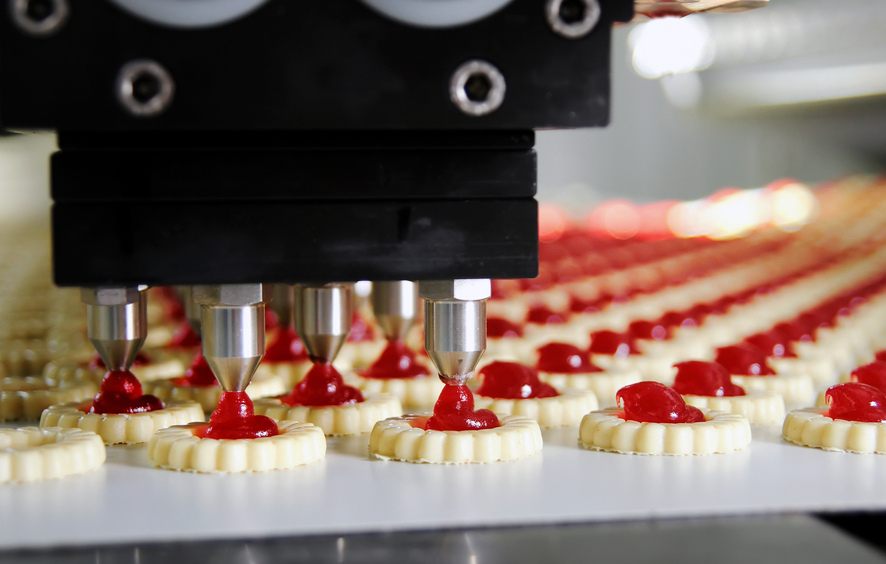Working At A Cookie Factory Ruined Cookies For Me Forever

(Photo: Vic/flickr)
I’ve done a lot of strange things to make money. I’ve picked strawberries, mopped the floors of a McDonald’s, waited tables at a stuffy family restaurant, and passed plates of tiny appetizers at Robert De Niro-hosted charity events. I’ve barbecued chicken over a fiery pit, deep-fried Twinkies at dusty county fairs, and painted park benches in sweaty summer heat. I’ve been a secretary (not an assistant, as I was constantly reminded) to a musty insurance adjuster, and a computer lab assistant who knew very little about computers.
But the worst job in a long line of worst jobs was the cookie factory. I found myself there one college summer, when I was too broke to stay in my college town but not connected enough in my hometown to score a gig at one of the good factories. But at $10.50 an hour, the cookie factory paid better than waiting tables or picking strawberries. Plus, my cousin had an in.
A week before my first day, I had to pee into a cup. After that, a Laotian woman wearing heavy make-up and multiple hairnets used pliers to remove my earrings. The factory, I was promptly told, did not allow piercings. On the policy of plastic gloves, the factory was quite lax.
If I said which packaged snack food company’s products I packaged, I would probably run into trouble because of some ridiculously one-sided contract I signed shortly after peeing into the cup. Let’s just say it’s a very popular one.
It’s now been 10 years since I worked at the junk food mill, and I still won’t eat another [Very Popular Cookie].
On my first day I was assigned to a sorting line, where I, along with one other woman, leaned over a waist-high vibrating tray designed to sort and arrange the freshly baked cookie halves. All I had to do was reach in and pull out any broken ones before they were paired off into sandwiches. Within minutes, the warmth of the ovens caused my partner’s arms to moisten with sweat; a few hours into our shift and it was everywhere: her brow, her pit stains, the underside of her belly. A healthy amount of that sweat made its way onto the cookies.
The first rule of the cookie factory: Don’t think about anything, ever. Letting my brain run on autopilot became an essential defense mechanism. Robots did the hard work; us humans mostly waited around for one of the various machines to hiccup. That meant staring at the same spot for hours, like a living, breathing failsafe. Little bags of cookies zipped by on a conveyor belt; we grabbed the ones that didn’t seal properly. Graham crackers fell into line for their plastic sleeves; we pulled out the broken bits. Only five packs of fruit snacks were dropped into a six-pack box; we jammed an extra bag in before it was sealed.
I daydreamed. The lonely monotony of staring at plastic packaging and moving belts of junk food fueled an inner dialogue that was hard to turn off. For the first hour or so or each shift, I’d sing the chorus of “Dark of the Matinee” by Franz Ferdinand. It was bouncy like a kid’s song, and it mentioned a factory. Find me and follow me through corridors, refectories, and files, you must follow, leave this academic factory! Then I’d make up dumb metaphors: On the packaging line, I am an industrial earthworm, encountering and fertilizing the dirt for the next earthworm to do their wormy thing with it.
I’d also do a lot of math. How fast were we churning out these little snack cracker bags? If I maintained an average of seven boxes with 10 single-serving bags every minute for eight hours straight, at what rate was I imparting these packs of [Popular Snack Crackers] to the world? Furthermore, if there were six people on the line and my rate was the average, how many crates would go out in one shift? If the first shift had twice as many workers and the third had half as many, what is the approximate rate of [Popular Snack Cracker] production in one 24-hour period? Furthermore, if my factory provides cookies, crackers, and snack foods for the entire nation, and approximately 295,734,134 people live in America, what is the country’s daily rate of [Popular Snack Cracker] consumption?
The answer, I found, is 0.000382. Individual Americans consume single serving bags of [Popular Snack Cracker] at a daily rate of 0.000382. (I like to think my calculations produced reliable approximations, despite having not exposed myself to any sort of mathematics since high school geometry, circa 1999.)
There’s a very real and very isolated sadness to factory work. I found my soliloquies increasing in idiocy by the day. I’d even taken to drinking a PBR tall boy on the drive home, and a few more once I got home, just to shut off my silly, rambling, autopilot mind. At least in my other monotonous low-wage jobs, I got to interact with other human beings. Here, my brain was rotting.
At one point I tried to teach myself Japanese. I thought if I carried an index card with new phrases each day and practiced them for the full eight hours, I’d be fluent by the summer’s end. So simple! It was the perfect plan to make my life at the junk food mill somehow productive. Before I clocked in, I sounded out Ogenki desu ka (“How are you?”), repeating it as I walked to my spot on the snack cracker line. But wait, was it desu ka or deku sa? My hands were too occupied sorting bags to pull out the card and peek again.
I tried again during my lunch break, and gave up by the afternoon break. I’d already spoiled my mind with too many moronic mental tricks. There was no way a few foreign phrases could hold my attention for eight hours, even if I made them into songs.
After that I just stared, as mindlessly as possible, at whatever was in front of me. Some days, it was cookie bags with “Healthy Living Tips” printed on the packaging. Apparently, and incredibly, [Packaged Food Conglomerate] believes low-fat cookies are an integral part of a balanced weight-loss regimen. The first tip I read was “Park farther away so you can burn more calories walking from your vehicle.” I once tried to point out the irony of health tips on a cookie package to the woman next to me. Because of the noise, and our earplugs, and a language barrier, her answer was like charades: OK, she’s pretending to eat the cookies, OK, now she’s grimacing, I think she’s saying the cookies taste bad. Nod like you understood. She’s nodding and smiling too. Congratulations, you have communicated with someone!
On the chewy cookie line, I’d entertain myself by squishing stray cookies under my shoes. They were gooey enough to congeal and stiffen, forming a sort of cookie moon boot that made me three to five inches taller by the end of the shift. The goo had to be painstakingly scraped off like gum under a table, and the factory even had a designated cookie moon boot pick-axe tool for this purpose. Congealed cookie goo never leaves a shoe’s crevices though. It is unwise to wear cookie factory shoes around dogs, mice, or raccoons.
I liked to guess the exact minute when my line operator, Lu, would walk over and make the “break” sign, a pantomime of snapping a stick in half. Break time meant 10 timed minutes off the line, but first, you had to clock out. To milk the opportunity, I would saunter slowly, in a roundabout path, toward the clock, hitting all three bathrooms located on opposite ends of the facility on my way. En route I’d cross two metal bridges, with swift currents of cinnamon graham crackers rushing along on a treadmill below.
I got used to the stench of baking and chocolate and syrup. At first I felt like a sugar princess. My eyelashes and sneezes and wisps of hair would sparkle and pulse with sweet granulate as I moved. But once I started to sweat, the sugar sand on my brow would mix with the hot sweetness hanging in the air to produce a sort of sheen of all-over sticky that covered every exposed inch of me. A gnat actually got stuck in my forearm hair once.
I thought I’d return to college in the fall a needy mess, desperate for human interaction and mental stimulation. But the summer spent inside my own head had a strange effect on me. I zoned out in class. I bored easily in conversations with friends. I got caught up in my own thought-digressions, and I frequently sang to myself. The factory had embedded static-y fuzz over my brain, like I was slightly high all the time. It took me a month to snap out of my funk. But at least when I did, I had a few good party stories to tell. They all began: “Never eat [Very Popular Cookies]. Let me tell you why.”
 Welcome to No One’s Watching Week, the time of the year when the readers are away and your tireless editors have run amok. For this week only, Atlas Obscura, New Republic, Popular Mechanics, Pacific Standard, The Paris Review, and Mental Floss will be swapping content that is too out there for any other week in 2015. This article originally appeared in Pacific Standard.
Welcome to No One’s Watching Week, the time of the year when the readers are away and your tireless editors have run amok. For this week only, Atlas Obscura, New Republic, Popular Mechanics, Pacific Standard, The Paris Review, and Mental Floss will be swapping content that is too out there for any other week in 2015. This article originally appeared in Pacific Standard.








Follow us on Twitter to get the latest on the world's hidden wonders.
Like us on Facebook to get the latest on the world's hidden wonders.
Follow us on Twitter Like us on Facebook